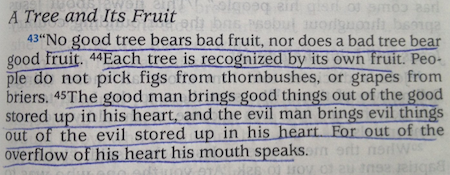I planned to skip this week’s habit profile. Continuing my series as if Easter were just another Sunday didn’t feel right. But, during my study time last week, a question popped in my mind: what were Jesus’ habits?
It turns out that I’m not the first person to have asked that question. There are two great books on the subject – The Jesus Priorities by Christopher Maricle and The Jesus Habits by Jay Dennis.
I’m particularly struck by the way Maricle approaches the question.
Isolated incidents reveal little about an individual, but reflecting on patterns of behavior reveals the content of a person’s character and the values that person holds. The way we spend our time and resources is an expression of our values. Jesus told us this himself when he taught us that “each tree is known by its own fruit” (Luke 6:44). So reflecting on how Jesus spent his time should be instructive. What did he say over and over again? What did he do repeatedly?
By sorting the events and recordings of Jesus’ life by principle, Maricle identified 8 priorities. I decided that there was no better way to celebrate this Easter Sunday than to share them with you.
1. Healing
More than anything else, Jesus healed people. Within this, he displays a habit of compassion. Whether he was traveling or focused on something else, Jesus never overlooked an opportunity to be compassionate. Further, Jesus did not distinguish between friends and strangers, recognizing their needs equally.
2. Love
Known as the great commandment, Jesus tells us to “love the Lord your God with all your heart” and secondly to “love your neighbor as yourself” (Matthew 22:35-40). Through his stories and parables, Jesus teaches us to share God’s love with people in need, “regardless of faith, nationality, or even prior sins.” Further, Jesus habitually offers mercy and forgiveness – no matter what.
3. Pray
Time and again, Jesus demonstrated the importance of prayer. “… Before day, he rose and went out to a lonely place, and there he prayed” (Mark 1:35). In particular, he prayed alone and he prayed simply. When instructing his disciples, he taught them the Lord’s Prayer (Matthew 6:9-13).
4. Spreading the Word
Inviting both strangers and friends to proclaim the good news of the Gospel, Jesus modeled how we, too, are to share the message. Maricle continues, “The approach Jesus used was comforting, because his invitation to God’s love was deeply connected to healing, forgiveness, and compassion.” “Jesus’ invitations were intertwined with his service to others.” Further, he invited everyone – tax collectors, prostitutes, lepers, and the disciples.
5. Building Up Treasure in Heaven
Jesus didn’t overlook our financial habits either, teaching key principles through parables and stories. In the story of the rich fool, Jesus warns that seeking comfort and security through financial resources distracts us from more important matters. When he feeds the 5,000, Jesus demonstrates the abundance mentality, teaching us to “find peace through generosity rather than through ownership.”
6. Seeking God’s Will
Found throughout the gospel of John, Jesus is “our model for uniting our will to God’s will.” In outlining why this is often difficult for us, Maricle shares a unique metaphor for modern times: the sacrifice fly in baseball. Just as the batter focuses not on himself, but on the long-term goal of scoring runs, we too can learn to “sacrifice” our daily distractions and busyness to focus on our purpose.
7. Accept Children as Precious
Despite few rights provided by their societies, Jesus told us that children would “inherit the kingdom.” He teaches us to welcome children, promising “whoever receives one such child in my name receives me (Matthew 18:5). Focusing on their spiritual protection as well as physical, Jesus provides parents additional guidance and encourages us to work together as a “village.”
8. Living with Humility
Whether through washing feet or seating assignments for weddings, Jesus taught that leaders must first be servants. He reminded us to be humble with God – and with each other. Through the parable of the laborers, he warned us against allowing our egos to find offense in others or seek comparisons. On the other hand, biblical humility is not synonymous with weakness or false modesty. Instead, Jesus teaches us to shine our lights for God’s glory (Matthew 5:14-15).
——
If these habits resonate or interest you, I’d certainly encourage you to read the entire book from Christopher Maricle, The Jesus Priorities.









Kendra, this is a very cool idea – approaching habits as the key to issues beyond faith. I think you are on to something. Thanks for the review, (maybe post it on Amazon?)
I will check out more of your work – I am definitely intrigued.
Blessings on you 🙂
Christopher –
Thanks so much for stopping by – and for your amazing book! I still keep it on my desk to keep the ideas fresh in my mind. I’ll definitely go leave a review on Amazon, and I’d love to know more of your thoughts on this approach to habits.
Hi Kendra, 🙂
The concept of habits continues to evolve for me, and I am convinced that the greatest challenge is to shift of our concept of habits from ‘things I do’ to ‘a way of thinking and seeing the world.’
Being aware of our own thinking is one of the keys to spiritual growth. Habits of the mind are what Jesus mastered.
Blessings back atcha 🙂
I enjoyed this article, Kendra. I came across it looking specifically for “What were Jesus’ habits” for an upcoming teaching time at my ladies’ group at church. After reading what you wrote, I looked through your site – expecting to find you were a Christian author, and surprised to see what you actually coach! Thank you for adding this teaching…and for referencing the other two books. I appreciate your work!
Blessings –
Denise
Thanks, Denise! So glad this was helpful and led to more fun discoveries. Blessings to you too!